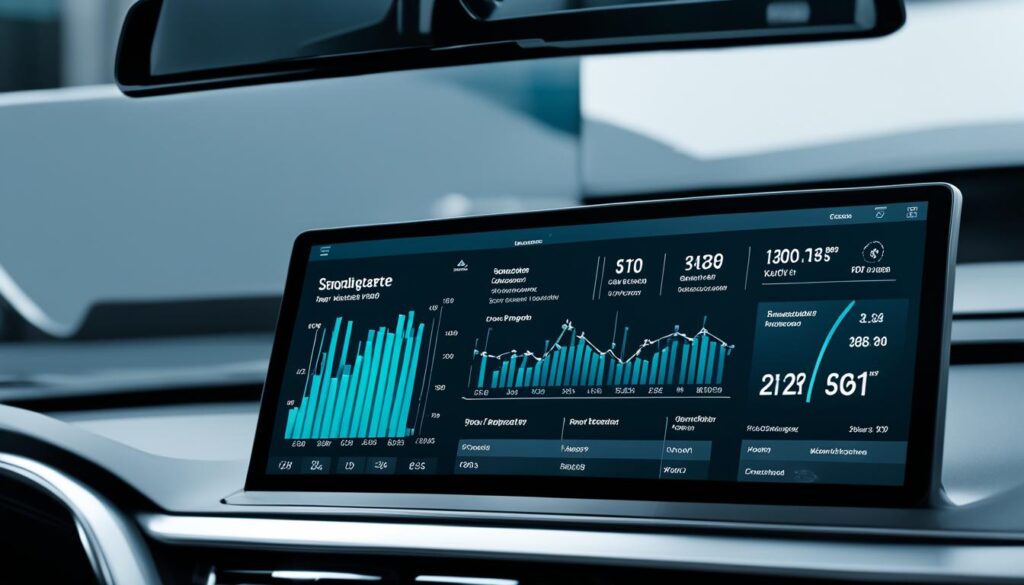Did you know that the global automotive manufacturing industry is projected to reach a value of $900 billion by 2026?
This staggering statistic highlights the immense scale and growth potential of the automotive sector. As automotive businesses strive to keep pace with increasing demand and ever-evolving industry trends, it has become crucial for them to streamline operations and drive growth efficiently. This is where the ERP software comes into play.
In this article, I will guide you through the top ERP software for Automotive industry. We will explore how these software systems can help optimize processes, improve efficiency, and make data-driven decisions, ultimately enabling automotive businesses to stay competitive and thrive in this dynamic industry.
Key Takeaways:
- The global automotive manufacturing industry is projected to reach a value of $900 billion by 2026.
- Streamlining operations and driving growth are crucial for automotive businesses in an increasingly competitive market.
- The best ERP software solutions for the automotive industry can provide the necessary tools and features to streamline processes, improve efficiency, and enable data-driven decision-making.
- Choosing the right ERP system and implementing it effectively are key considerations for automotive businesses.
- Successful ERP implementation in the automotive industry can lead to improved operational efficiency, reduced costs, enhanced supply chain management, and increased customer satisfaction.
Demystifying ERP software for Automotive
As an automotive business owner, you may have heard of ERP software and wondered what it is and how it can benefit your operations. ERP, which stands for Enterprise Resource Planning, is a comprehensive software solution designed to streamline and integrate various aspects of your business, ranging from manufacturing and supply chain management to dealership operations.
By implementing an ERP system, you can centralize and automate your business processes, allowing for better coordination, increased efficiency, and improved decision-making. This technology provides a single source of truth, enabling you to access real-time data and insights across departments, locations, and business functions.
What is ERP software and how can it benefit your automotive business?
ERP software is a powerful tool that can revolutionize the way you manage your automotive business. Here are some key benefits it can bring:
- Streamlined operations: ERP solutions automate manual processes, reducing the need for paperwork and streamlining workflows. This results in improved operational efficiency and productivity.
- Enhanced visibility: With ERP, you gain real-time visibility into your entire business, from inventory levels and production status to sales and financial data. This visibility enables you to make informed decisions based on accurate, up-to-date information.
- Improved supply chain management: ERPs help optimize your supply chain by facilitating demand forecasting, inventory management, and order tracking. By keeping a tight grip on your supply chain, you can minimize disruptions, reduce costs, and ensure timely delivery of products.
- Integrated dealership management: ERP solutions can integrate dealership management functions, such as vehicle sales, customer relationship management (CRM), and after-sales service. This integration provides a cohesive view of your customer interactions and allows for efficient management of sales and service operations.
Key challenges faced by the automotive industry and how ERP can address them
The automotive industry faces several key challenges, from managing complex supply chains to tracking warranties and ensuring quality control. However, ERP systems can help address these challenges in the following ways:
- Complex supply chains: ERP solutions provide end-to-end visibility into your supply chain, enabling you to track materials, monitor production progress, and manage suppliers effectively.
- Inventory management: With an ERP system, you can optimize inventory levels, improve demand forecasting, and ensure that the right parts are available at the right time.
- Warranty tracking: ERP software can automate warranty tracking processes, making it easier to manage warranty claims, track warranty-related costs, and ensure timely resolution of customer issues.
- Quality control: ERP systems enable you to implement quality control measures, track product defects, and analyze quality performance data to identify areas for improvement.
By addressing these challenges, ERP solutions empower automotive businesses to enhance operational efficiency, reduce costs, improve customer satisfaction, and drive sustainable growth.
Choosing the Right Automotive ERP System
In order to optimize operations and drive growth, it is crucial for automotive businesses to choose the right ERP system. Selecting an automotive ERP solution requires careful consideration of various factors and an understanding of the top features that will meet your specific needs.
Factors to Consider When Selecting an Automotive ERP Solution
When evaluating ERP options, there are several factors to keep in mind:
- Scalability: Ensure that the ERP system can accommodate the future growth of your automotive business.
- Flexibility: Look for a solution that can be customized to meet your unique requirements and adapt to changing industry needs.
- Industry-specific functionality: Choose an ERP system specifically designed for the automotive industry, with features and modules tailored to your business processes.
- Integration capabilities: Consider the ERP solution’s ability to integrate with other software or systems already in use within your organization.
- Vendor reputation: Research and evaluate the reputation, experience, and track record of ERP vendors to ensure reliable service and support.
Top Features to Look for in Automotive ERP Software
Here are the essential features that automotive companies should prioritize when selecting an ERP solution:
- Demand forecasting: Accurately predict customer demand to optimize production and inventory levels.
- Inventory management: Effectively track and manage automotive parts and components across multiple locations.
- Supply chain optimization: Streamline and automate supply chain processes for increased efficiency and reduced costs.
- Production planning: Plan and schedule manufacturing activities to meet demand and optimize resources.
- CRM (Customer Relationship Management): Manage customer interactions and improve customer satisfaction through robust CRM functionality.
- Financial management: Gain better control over financial processes, including accounting, invoicing, and financial reporting.
- Analytics: Access real-time data and generate meaningful insights to drive data-driven decision-making and continuous improvement.
By carefully considering these factors and features, automotive businesses can confidently select an ERP system that aligns with their specific needs and empowers them to streamline operations, improve efficiency, and drive growth in the competitive automotive industry.
Top Considerations for a Successful Automotive ERP Implementation
In order to ensure a successful implementation of an ERP system in the automotive industry, there are several key considerations that businesses need to take into account. These considerations will help drive the efficiency and effectiveness of the ERP implementation and maximize the benefits for the organization.
Cloud-based vs. On-premise vs. Hybrid ERP Deployment Options for Automotive Businesses
One of the first decisions that automotive businesses need to make when implementing an ERP system is whether to opt for a cloud-based, on-premise, or hybrid deployment model. Each option offers its own set of advantages and disadvantages, and the choice depends on the specific needs and requirements of the organization.
Cloud-based ERP: This deployment option offers the flexibility of accessing the system from anywhere with an internet connection. It eliminates the need for on-premise infrastructure and provides scalability and automatic updates. However, it may raise concerns regarding data security and dependency on internet connectivity.
On-premise ERP: With an on-premise deployment, the ERP system is hosted on the company’s own servers. This provides complete control over data and infrastructure. However, it requires upfront investments in hardware and IT resources, and software updates may be more time-consuming.
Hybrid ERP: The hybrid deployment model combines elements of both cloud-based and on-premise solutions. It allows organizations to leverage the benefits of both options, ensuring flexibility and data control. However, it may require additional efforts for integration and maintenance.
Developing a Data Migration Strategy
Another crucial consideration for successful ERP implementation in the automotive industry is developing a robust data migration strategy. Migrating data from existing systems to the new ERP system requires careful planning and execution to ensure accuracy, completeness, and data integrity.
A well-defined data migration strategy should include:
- Mapping and categorizing existing data
- Identifying data cleansing and validation requirements
- Establishing data migration timelines and milestones
- Testing and verifying migrated data
By following a structured data migration approach, automotive businesses can minimize the risk of data loss, ensure smooth operations during the transition, and maintain data consistency across the organization.
Change Management and User Training Strategies
Implementing an ERP system brings significant changes to an organization’s processes, workflows, and roles. Managing these changes effectively and providing comprehensive user training are critical for successful adoption and utilization of the ERP system.
Key strategies for change management and user training include:
- Engaging stakeholders and creating a change management plan
- Communicating the benefits and objectives of the ERP implementation
- Identifying and addressing resistance to change
- Providing training sessions and support materials for end-users
- Monitoring and evaluating user adoption and performance
Effective change management and user training ensure that employees embrace the new ERP system, understand its functionality, and utilize it to its full potential, resulting in improved process efficiency and productivity.
Case Studies: Automotive Businesses Thriving with ERP
In this section, I will present case studies of real automotive businesses that have implemented ERP systems and are now thriving in the industry. These success stories demonstrate the benefits of implementing an automotive ERP system and highlight the positive impact it can have on business operations, cost reduction, decision-making, supply chain management, and customer satisfaction.
Case Study 1: BMW
BMW started using an ERP system in the 1990s, and it has played a big role in their success. The system helped BMW work better, spend less money, and make better cars.
For example, the ERP system helped BMW keep 20% less stuff on hand. This saved them tons of money in storage costs. It also helped them make better cars because they could see what was happening on the factory floor as it happened. This let them find and fix problems quickly.
Case Study 2: Toyota
Toyota is another car company that has seen great results from using an ERP system. Toyota is famous for its high quality and efficiency, and their ERP system plays a big part in that.
This system helped Toyota make their production faster and cheaper. For example, it cut the time it takes them to make a car in half! This lets them get cars to customers faster and keep up with what people want.
Case Studies 3 – 5: General Motors, Volkswagen, Hyundai
These other car companies – General Motors, Volkswagen, and Hyundai – also use ERP systems. Each one has seen similar benefits:
- Improved efficiency: They get work done more smoothly.
- Reduced costs: They don’t spend as much money.
- Better quality: They make higher quality cars.
These case studies clearly demonstrate the tangible benefits of implementing an automotive ERP system. By streamlining operations, reducing costs, improving decision-making, and optimizing supply chain management, automotive businesses can thrive in a competitive industry. The success achieved by BMW, Toyota, General Motors, Volkswagen, and Hyundai serves as a testament to the positive impact ERP systems can have on the automotive industry as a whole.
Top ERP Software Options for the Automotive Industry
In the fast-paced and demanding automotive industry, having the right ERP software can make all the difference in improving operations and driving growth. With a multitude of options available, it can be overwhelming to choose the best ERP solution for your business. To help you make an informed decision, here are some of the top ERP software options:
SAP
SAP offers a comprehensive ERP solution specifically tailored for the automotive industry. With its robust functionality and deep industry expertise, SAP provides end-to-end process integration, supply chain management, and analytics capabilities. It enables automotive companies to optimize production, manage complex supply chains, and improve customer satisfaction.
Oracle

Oracle offers a powerful ERP software that delivers industry-specific functionality for automotive businesses. It provides real-time visibility into critical business processes, including inventory management, procurement, sales, and financials. With Oracle, automotive companies can streamline operations, achieve cost savings, and accelerate innovation.
NetSuite
NetSuite, a cloud-based ERP solution, offers comprehensive capabilities for automotive businesses. It provides a single, integrated platform for managing finances, operations, and customer relationships. NetSuite’s scalability, flexibility, and real-time visibility empower automotive companies to adapt quickly to market demands, improve efficiency, and drive growth.
Microsoft Dynamics 365
Microsoft Dynamics 365 offers a unified ERP solution that combines ERP, CRM, and business intelligence capabilities. With its industry-specific functionality and powerful analytics, it enables automotive companies to optimize operations, enhance customer engagement, and streamline processes. Microsoft Dynamics 365 provides a seamless user experience and integration with other Microsoft products.
Infor CloudSuite Automotive

Infor CloudSuite Automotive is specifically designed to meet the unique needs of the automotive industry. It offers comprehensive capabilities for managing suppliers, production, service, and finance. Infor CloudSuite Automotive enables automotive businesses to streamline operations, improve collaboration, and enhance customer satisfaction.
When choosing an ERP software for your automotive business, consider your specific requirements, industry expertise, scalability, and integration capabilities. Take the time to evaluate each solution and its alignment with your business goals. Ultimately, selecting the right ERP software can transform your operations and drive success in the competitive automotive industry.
Conclusion – Why Invest in an Automotive ERP System Today?
In conclusion, investing in an automotive ERP system is crucial for businesses in the automotive industry. Throughout this article, we have discussed the various benefits and advantages of implementing an ERP system tailored to the automotive sector. By doing so, automotive businesses can streamline their operations, enhance efficiency, make data-driven decisions, and improve supply chain management, ultimately driving business growth.
An automotive ERP system provides a centralized platform that integrates key business functions and provides real-time data and insights. This enables businesses to optimize processes, enhance visibility, automate critical operations, and improve the overall efficiency of their operations.
In a rapidly evolving industry like the automotive sector, staying competitive is essential. By investing in an effective ERP system, automotive businesses can address the unique challenges they face, such as managing complex supply chains, optimizing inventory, and ensuring quality control. ERP software offers industry-specific features and functionalities that specifically address these challenges, providing automotive businesses with a competitive edge.
Furthermore, an automotive ERP system empowers businesses to make informed decisions based on accurate and up-to-date information. With integrated modules for demand forecasting, inventory management, production planning, financial management, and analytics, businesses can leverage data to identify trends, optimize processes, and drive profitability.
To future-proof their operations and drive growth, automotive businesses should seriously consider investing in an ERP system. The benefits are far-reaching – from improved operations to enhanced customer satisfaction, an automotive ERP system can transform businesses and position them for long-term success in the dynamic automotive industry.
Image: An automotive ERP system can drive growth and improve operations in the automotive industry.
Next Steps – How to Get Started with Selecting and Implementing an Automotive ERP
Now that you understand the benefits of implementing an ERP system in your automotive business, it’s time to take the next steps towards selecting and implementing the right solution. To assist you in this process, I have compiled a list of valuable resources that can provide you with additional insights and guidance.
Free Downloadable Resources
When it comes to choosing an automotive ERP system, knowledge is power. That’s why I recommend exploring free downloadable resources such as whitepapers and case studies. These resources can give you a deeper understanding of ERP software and how it has benefited other companies in the automotive industry. They can also provide you with valuable information on best practices, implementation strategies, and industry-specific challenges. To access these resources, simply click on the following links:
- Whitepapers: Unleashing the Power of ERP in the Automotive Industry
- Case Studies: How Automotive Businesses Achieved Success with ERP
Free Consultations with ERP Software Vendors
Another crucial step in selecting and implementing an automotive ERP system is engaging with software vendors. They can offer you expert advice tailored to your specific needs and help you find the right solution for your business. Most ERP vendors offer free consultations where you can discuss your requirements, ask questions, and get a better understanding of the features and capabilities of their software. To schedule a free consultation, you can reach out to the following ERP vendors:
- SAP Automotive ERP
- Oracle Automotive ERP
- NetSuite Automotive ERP
- Microsoft Dynamics 365 for Automotive
- Infor CloudSuite Automotive ERP
By leveraging these free resources and consultations, you can gather the information and insights needed to make an informed decision and seamlessly implement an ERP system that will optimize your operations and drive growth in the automotive industry.

